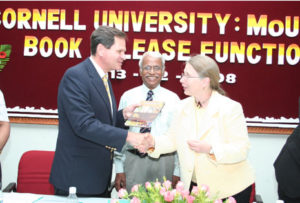Recent trends in the global food industry have resulted in a demand for professionals with awareness and expertise in ground breaking trends in the area of food processing, value addition and marketing complemented by international exposure and global perspectives. To this end, the Tamil Nadu Agricultural University (TNAU), Coimbatore, a leader in agricultural education in South Asia, in partnership with Cornell University, USA, a major centre for agricultural research and education in the world will offer students in India and South Asia a dual master’s degree programme that integrates Cornell’s Master of Professional Studies (MPS) in Food Science and TNAU’s Master of Technology (M.Tech) in Food & Agricultural Process Engineering.
The proposed programme will fill the currently unmet need of food industry professionals for a course that can effectively combine science, technology and management knowledge and skills together to benefit an industry characterized by high levels of global integration. Participants to the programme will also be trained on how to engage in rural development that will result in sustainable gains through enterprise development and technology transfer
The memorandum of understanding (MOU) to this effect was signed by TNAU Vice-Chancellor Prof. C. Ramaswamy and Dr. Susan A. Henry, Dean, College of Agriculture and Life Sciences, Cornell University, on 13 February 2008 at the TNAU campus in Coimbatore, Tamil Nadu, India.
“In a bid to make farm graduates of the TNAU on a par with engineering and Information Technology (IT) graduates in terms of developing in them a global mindset, the university has embarked upon some path-breaking measures. This is the first time a State Agricultural University in India is entering into an MoU for a dual degree programme,” said Prof. Ramaswamy at the event.
In her address Dean Susan said that the partnership was “path-breaking” and would “involve collaboration, both in research and education.” She continued that both universities had “a common interest to enhance the ilk of farmers and their community, students as well as the society at large,” and that the partnership was designed to achieve this goal.
The Cornell – Sathguru Foundation for Development will provide support in program management and will also support in the establishment of requisite industry linkages that will ensure program success. The Cornell – Sathguru Foundation for Development has earlier supported joint initiatives like the course entitled International Agriculture in Developing Nations II (INTAG) 402 and 602 courses offered by Cornell University with TNAU. Cornell – Sathguru Foundation for Development derives funding support from industry and other philanthropic trusts.
Book Release of Economic and Environmental Benefits and Costs of Transgenic Crops: Ex-Ante Assessment

Economic and Environmental Benefits and Costs of Transgenic Crops: Ex-Ante Assessment, published by the Tamil Nadu Agricultural University (TNAU) with support from the Agricultural Biotechnology Support Project II (ABSPII) was released on February 13, 2008 at an event held on the campus of TNAU, Coimbatore
The book was released by Dr. Susan A. Henry, Dean, College of Agriculture and Life Sciences, Cornell University, and George Deikun, Mission Director of USAID – New Delhi received the first copy.
The United States Agency for International Development (USAID) funded ABSPII is a global consortium led by Cornell University. ABSPII focuses on the safe and effective development and commercialization of bio-engineered crops as a complement to traditional and organic agricultural approaches. The project helps boost food security, economic growth, nutrition and environmental quality in East and West Africa, Indonesia, India, Bangladesh and the Philippines. In India and Bangladesh, the project is managed by Sathguru Management Consultants, the Associate of Cornell in India.
In his address at the book release, Prof. Ramaswamy, Vice Chancellor of TNAU, said that the aim of ABSPII was to “strengthen public research capacity in delivering economic and environment benefits to resource constrained farmers through the development of genetically modified (GM) crops, for which alternative solutions are less feasible.”
The ABSPII aims to strengthen the public research capacity in delivering economic and environment benefits to resource constrained farmers through the development of genetically modified crops, for which alternate solutions are less feasible. Fruit and shoot borer resistant eggplant (Brinjal), virus resistant groundnut, late blight resistant potato and drought and salinity tolerant rice are some of the traits that are currently supported by ABSPII for product validation and adoption by resource constrained farmers. The unique public – private partnership championed by ABSPII provides an opportunity for patent pooling by the public and private sectors for mutual advantage. The access to technology for resource constrained farmers is provided by the public research institutions through royalty free technology transfer and non-profit sale of seeds that would help farmers to access seeds at affordable cost for public varieties that are widely adopted by farmers.
The book presents the results of a series of studies undertaken over the past four years to assess potential economic impacts of transgenic insect resistant (Bt) eggplant, drought and salt-tolerant (DST) rice, tobacco streak resistant groundnut and sunflower, late blight resistant potato and pod borer resistant chickpea in India and Bangladesh. For GM varieties still under development and not commercially approved, it is important to study the potential economic impact that could result from their adoption (ex ante studies). Ex ante studies have a strong modeling component. Sensitivity analysis of the main parameters is always fundamental to the correct interpretation of the results. The book summarizes the projected level and distribution costs and benefits associated with these products in South Asia.
The research studies published in the book were undertaken by an eminent panel of Economists drawn from USA, Europe and South Asia. The book is edited by an eminent editorial board comprising George Norton of Virginia Tech University, USA, Prof. C. Ramasamy and Prof. K. N. Selvaraj of TNAU and Mr. K. Vijayaraghavan of Cornell – Sathguru.


